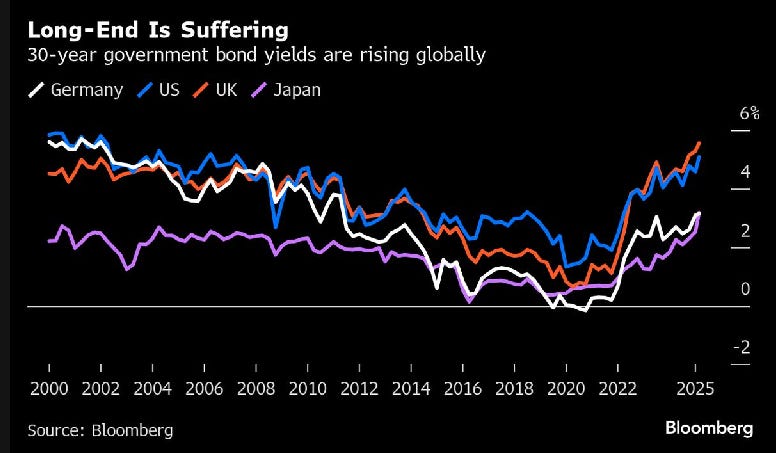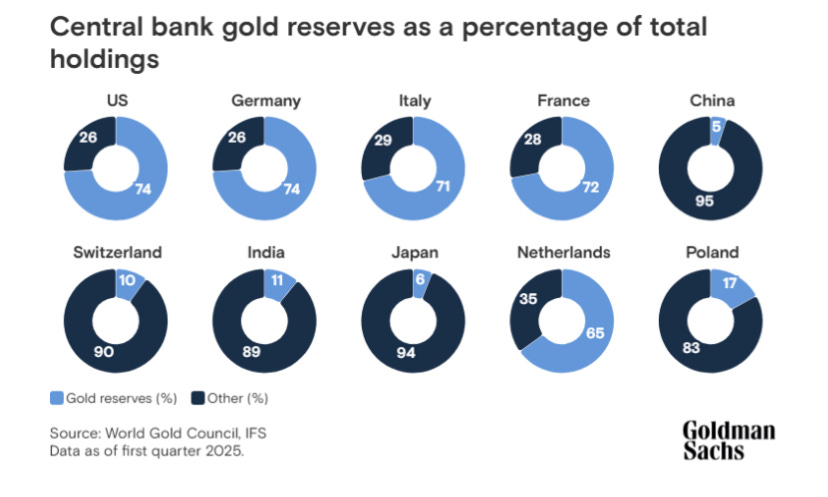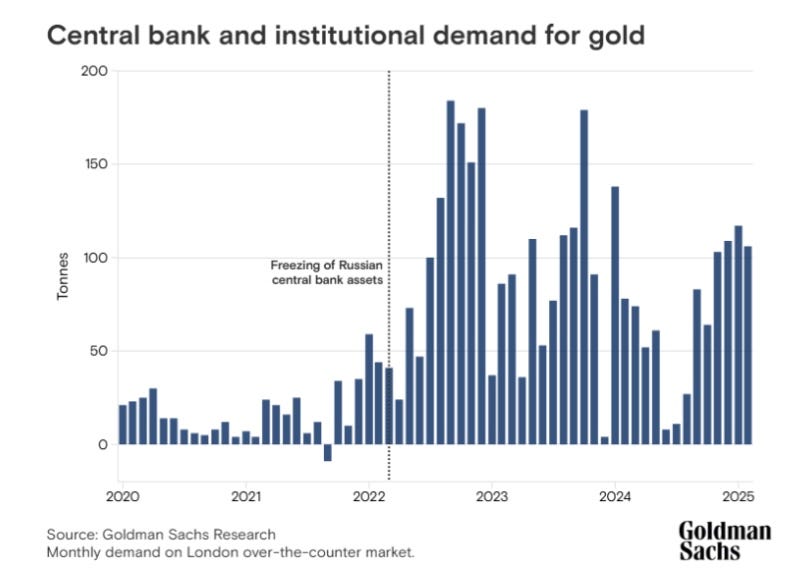Weekly Good Reads: 5-1-1
Tax Bills, Fiscal Concerns and Long Bond Yield, EU-US Tariffs, Gold, TIPs, Great Thinkers
Welcome to a new Weekly Good Reads 5-1-1 by Marianne, a 25-year investment practitioner sharing something interesting and topical in investing, the economy, wellness, and AI/productivity.
Thank you for supporting my work! Please hit the 💛 button if you like it or share with others.
Sharing the quote of the week:
Doing the best at this moment puts you in the best place for the next moment.
~ Oprah Winfrey
Weekly archives | Investing | Ideas | Index of charts and terms | Conversations with Investment Managers
👉 Interested in building customized and diversified investment portfolios tailored just for your goals and risk profile in 5 easy steps? Try R4A for free!
Market and Data Comment
In a week with light global economic data, the market has focused on the fiscal concerns in the US and elsewhere, like Japan. From the above, the long-term 30-year government bonds in major G7 countries have surged since the beginning of 2022 as fiscal policies loosened and inflation surged during the Pandemic, adding to the premium investor demand to invest in bonds, which means not only rising federal debt but rising interest payment costs.
US stocks declined around 2.5% to 3.5% for the week while EAFE (developed market ex-US) rose by 1.2% in dollar terms as the Dollar Index plunged 2%. The US high yield spread rose 24bp to 361bp, the VIX jumped 5% to 22.29%, the US 10-year Treasury yield rose 3bp to 4.51%, but the 30-year Treasury yield rose above 5% (5.04%), and gold prices jumped 4.8%.
In the US, the reconciliation bill was passed by the House of Representatives on Thursday, front-loading tax cuts until they expire in 2028-30 and back-loading spending cuts. See the projection of the US primary deficit by Barclays in the right-hand side graph below. Based on the current policy and reconciliation bill trajectory, the US primary deficit is expected to rise higher compared to if the TCJA tax cuts expire.
The point, though, is that the US debt would continue to rise even if TCJA tax cuts were to expire, which spooked investors and the rating agencies.
Goldman also projects that any stimulative/growth effects from the US fiscal package cannot offset the negative drag from tariffs on growth. DOGE has proven it has done very little for spending cuts.
With rising bond yields, Bloomberg Economics forecast worse interest payments as a % of GDP for the US, UK, Germany, and Japan compared to the Q1 baseline (the worst cases being the US and Japan, which adds to the public debt). Rising interest costs for both public and private sectors will crowd out private sector investments, hurting future economic growth. US mortgages at above 7% dampen the real estate sector.
In the case of Japan, the 30-year government bond yield rose from almost 0% before the Pandemic to over 3% now: any institutions like the banks, insurance companies, and pension funds which hold long-duration assets are suffering huge marked-to-market losses (recall US’ Silicon Valley Bank when depositors lost confidence and fled the bank).
From a macroeconomic perspective, a country that runs a large current account deficit has a large savings-investments gap, i.e. national savings are far below national investments, requiring the country to borrow externally or get capital financing like portfolio investments from foreigners.
The problem is compounded if a country runs a twin deficit - a large fiscal deficit (primary account excluding interest payments) and current account deficit, as in the case of the US (bottom left quadrant). Additional fiscal deficit worsens the current account deficit (see chart below).
As Trump threatened 50% tariffs on the EU (see Econ/Invest #3 for EU-US trade breakdown) and a 25% tariff on Apple, investors will continue to brace for trade policy uncertainty (see Econ/Invest #2).
This coming week, we will monitor Fed Chair Powell speech (Sunday), FOMC May meeting minutes on Wednesday, real Q1 US GDP on Thursday, University of Michigan May consumer sentiment survey, April US personal spending and core PCE price index on Friday, the first prints of May inflation in Euro Area countries, and China’s May PMI on Friday.
Economy and Investments (Links)
US Government Bonds Drop As Worries Over Trump’s Tax Bill Flare Up (FT or Archive)
We had a soft 20-year auction and when combined with the focus on the budget deficit, the market has a bias towards higher yields,” said Ian Lyngen, head of US rates strategy at BMO Capital Markets…
“Markets really have no appetite for duration here,” added Pooja Kumra, a rates strategist at TD Securities, referring to longer-dated securities.
+Related: Revenge of the Bond Yields (
)The De-escalation is Over (For Now) (Axios)
It was a reminder that there will be no permanent trade peace in this administration, only trade war lulls of uncertain duration. That reality could keep financial markets on edge.
Trade Between the U.S. and EU Is Massive. We Break It Down (WSJ or Archive)
Trade in goods and services with the EU accounted for around 4.9% of U.S. gross domestic product in 2024, according to Bureau of Economic Analysis data. That means trade with Europe is an even bigger part of the U.S. economy than trade with China, which accounted for 2.2% of U.S. GDP last year.
Finance/Wealth (Link):
At the Money: Morgan Housel on The Art of Spending Money (The Big Picture)
Housel: And for me, and I think you and many other people that is like, uh, like doing the best work that I can, but having full control over my schedule, doing a lot of reading, working when I want, with whom I want for as long as I want, being in control over my time. That’s what I want out of money. Using it as a tool rather than it using me to say, “Morgan, this is how you should spend your money. You should get these people’s attention. That guy’s car is faster than your yours. So you need to upgrade.” That is when money is using you rather than you’re using it.
The Wellness/Idea (Link):
How to be a Great Thinker— 7 Habits of Highly Intelligent People (FT or Archive)
Keep learning from everyone. Only mediocrities boast as adults about where they went to university aged 18. They imagine that intelligence is innate and static. In fact, people become more or less intelligent through life, depending on how hard they think. The best thinkers are always learning from others, no matter how young or low-status. I remember being at a dinner table where the two people who talked least and listened hardest were the two Nobel laureates.
+ Where I Get My Idea From (The Oatmeal, one of my favourite comics)
One Chart You Should Not Miss: Rise in Gold Reserves Demand by Central Banks
Whenever there’s a lot of uncertainty, traders temporarily park their money in gold. When there’s a clarity, gold prices tend to drop again because traders know what to do with their money~Goldman Sachs
Investment banks such as Goldman predicted the gold price will rise to $3,700 by the end of 2025, driven by two main factors: the health of the economy and market volatility. Gold shines as a safe haven, surging almost 18% since the end of February this year. Longer-term, multi-year demand from central banks will drive metal prices to a record high.
Central Bank and institutional monthly purchase of gold averaged about 17 tonnes during 2020-2022. Since the freezing of Russian central bank assets, the monthly demand for gold has surged to an average of 85 tonnes. Central banks’ purchase of gold will be driven especially by emerging markets, which hold much less than 20% of foreign exchange reserves in gold (see chart above) — countries’ average gold holding is about 20% of total.
One Term to Know: TIPS (Treasury Inflation-Protected Securities)
As shown in the above table, one $ invested in the S&P 500 has a compounded annual return of 10.3% before adjusting for inflation and only 7.1% p.a. after adjusting for inflation. So inflation erodes real investment value, whether you hold equities or bonds.
Do you know an instrument that rises when inflation and interest rates are both rising? Enter TIPs, Treasury Inflation-Protected Securities, which can be valuable during times of uncertainty, especially fixed income sell-offs, which are particularly concerning for near-retired and retirees. TIPS are available in 5-, 10-, and 30-year maturities.
How do TIPs protect investors from inflation?
(1) Principal Adjustment: The face value (principal) of TIPS increases with inflation and decreases with deflation, as measured by the CPI. TIPS help offset the negative impact of higher rates on bond prices.
(2) Interest Payments: TIPS pay interest twice a year at a fixed rate, and the coupon amount adjusts up or down depending on the principal adjustment.
(3) Maturity Guarantee: At maturity, the investor receives either the inflation-adjusted principal or the original principal, whichever is greater.
(4) Low Credit Risk: They are backed by the U.S. government, making them one of the safest fixed-income investments.
(5) Favourable Tax Treatment: Interest payments and inflation adjustments are subject to federal tax but are exempt from state and local taxes.
🌻Things I learned About AI/Productivity:
Google Brings AI Mode to the Masses (Superhuman AI)
Everyone in the US can now try AI Mode: It uses a custom version of Gemini 2.5 to deliver more detailed responses, so you no longer need to scan dozens of results to find what you’re looking for. You can also conduct a “deep search” for more complex research projects, or generate graphs and visualizations.
Sam (Altman) & Jony (Ive) introduce io (OpenAI)
In a sleek video featuring downtown San Francisco, the two friends got together to explain how they merged io with OpenAI to create a suite of devices for people to use AI beyond legacy products like iPhones. For more about Sir Jony Ive, check out my piece.
AI is an incredible technology, but great tools require work at the intersection of technology, design, and understanding people and the world. No one can do this like Jony and his team; the amount of care they put into every aspect of the process is extraordinary.~Sam Altman
According to
, the device has these features:Pocket-sized and screen-free
Not a phone, not glasses, not wearable
Aware of your life and context
Meant to sit beside your laptop and iPhone - yet act as neither
Thanks for reading!
Please do not hesitate to get in touch if you have any questions.
Please also check out my Conversations with female fund managers, wealth advisors, and more.
If you like this Weekly, please share it with your friends or subscribe to my newsletter🤝.















